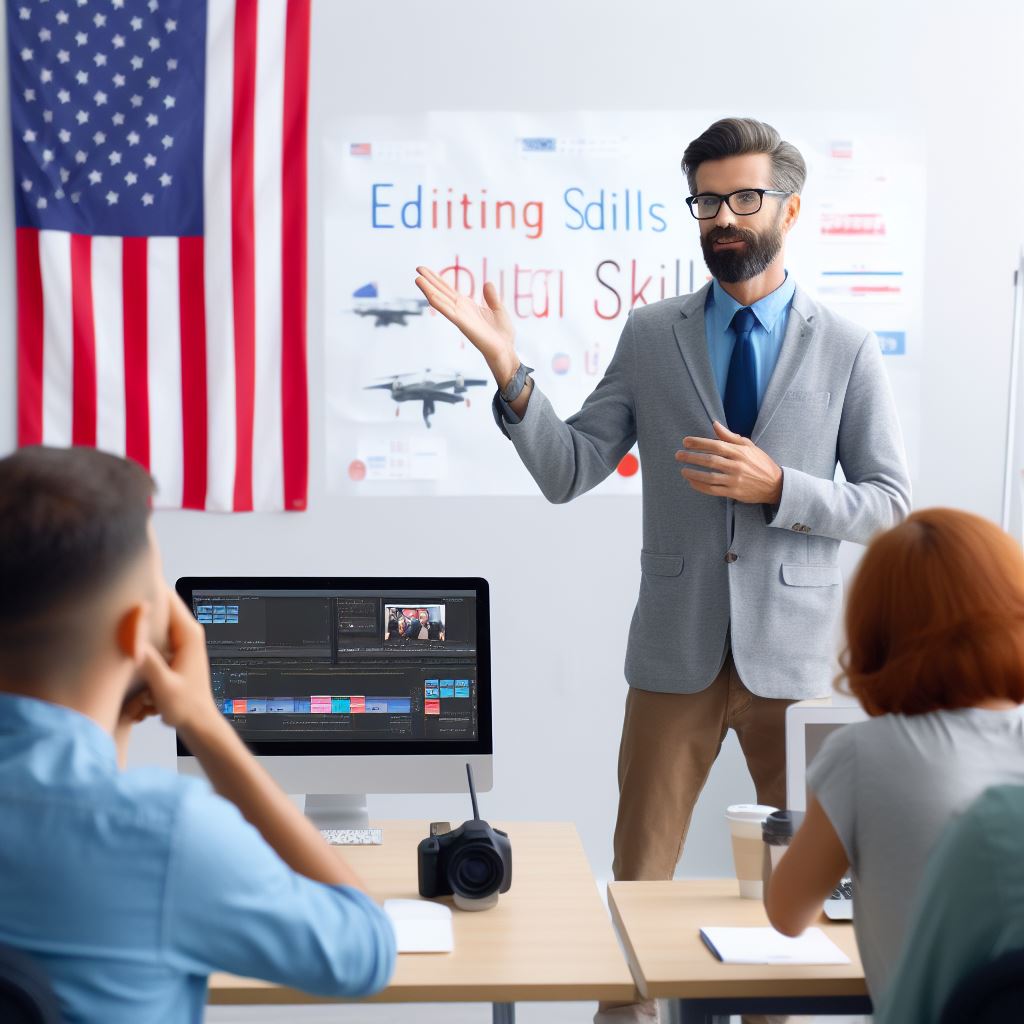Introduction
Mentoring in the US editing industry plays a significant role in the growth and development of individuals.
By providing guidance and support, mentors help aspiring editors navigate the challenges of the industry and develop their skills.
Brief explanation of mentoring in the US editing industry
In the US editing industry, mentoring involves a seasoned editing professional guiding and supporting a less experienced individual.
Mentoring relationships can take on various forms, such as one-on-one partnerships or group mentoring programs.
Importance of mentoring for growth and development
Mentoring is vital for the growth and development of individuals in the editing industry.
It offers a platform for mentees to gain insights from experienced editors, allowing them to enhance their knowledge and expertise.
Mentors provide constructive feedback, help mentees develop their editing techniques, and impart industry-specific knowledge.
This guidance allows mentees to improve their editing skills and keeps them current on industry trends and best practices.
Mentoring also aids in expanding professional networks.
Mentors can introduce mentees to industry connections, opening doors to new opportunities.
Mentees benefit from the guidance of their mentors, who can provide career advice and assist with navigating challenges and obstacles.
Furthermore, mentoring fosters personal growth by building confidence and self-esteem in mentees.
Mentors share their own experiences and challenges, inspiring mentees to overcome obstacles and achieve their goals.
Basically, mentoring in the US editing industry is crucial for the growth and development of individuals.
Through guidance, support, and knowledge-sharing, mentors empower mentees to excel in their editing careers, fostering personal and professional growth.
Definition of Mentoring in US Editing
Mentoring and its purpose
Mentoring in US editing refers to a professional relationship where an experienced editor, known as the mentor, guides and supports a less experienced editor, known as the mentee, to develop their skills and achieve their career goals.
The purpose of mentoring in US editing is to foster the mentee’s professional and personal growth by providing guidance, knowledge, and support.
It helps mentees gain industry insights, enhance their editing techniques, and navigate professional challenges.
Mentoring also aims to cultivate a sense of community within the editing field, sharing collective wisdom and building connections between seasoned editors and emerging talents.
Examples of different mentoring approaches in editing
Traditional Mentorship
- In this approach, a mentor and mentee have a one-on-one relationship, where the mentor provides individualized guidance and support.
- The mentor shares specialized knowledge, offers feedback on the mentee’s work, and provides career advice.
- Meetings can take place in person, via phone calls, or through online platforms, ensuring regular communication and progress tracking.
Peer Mentorship
- Peer mentoring involves a less hierarchical relationship, where editors at a similar career stage support and learn from each other.
- Peers share experiences, exchange editing techniques, and provide constructive critique and feedback on each other’s work.
- This approach fosters collaboration, encourages innovation, and builds a network of peers within the editing community.
Group Mentoring
- Group mentoring brings together a mentor and several mentees, creating a collaborative learning environment.
- Mentees benefit from both the mentor’s expertise and the collective wisdom of the group.
- Group mentoring offers diverse perspectives, fosters networking opportunities, and helps mentees develop a broader understanding of the editing profession.
Virtual Mentoring
- With advancements in technology, mentoring can now take place virtually, removing geographical barriers.
- Virtual mentoring utilizes tools such as video conferencing, email, and online forums to facilitate communication and interaction.
- Mentees can receive mentorship from experts across the country, widening their access to knowledge and opportunities.
Effective mentoring in US editing requires active engagement from both mentors and mentees.
Mentors should be experienced, knowledgeable, and willing to invest time and effort into their mentees’ development.
Mentees, on the other hand, should display enthusiasm, openness to feedback, and a commitment to their professional growth.
Mentoring in US editing is a valuable resource for emerging editors, not only providing guidance and skills development but also instilling confidence and a sense of belonging within the editing community.
By nurturing the next generation of editors, mentoring ensures the continued growth and success of the industry as a whole.
Read: Essential Editing Tools Every US Editor Must Know
Benefits of Mentoring in US Editing
Personal and professional growth opportunities for mentees
- Mentoring in US editing provides mentees with invaluable insights and guidance from experienced professionals.
- Through the mentor’s expertise, mentees gain new perspectives and approaches to editing, expanding their skill set.
- The mentor-mentee relationship fosters a supportive environment that encourages personal and professional growth.
- Mentoring offers mentees the chance to gain confidence in their abilities and acquire a deeper understanding of the editing field.
- Mentees also have the opportunity to develop effective communication and problem-solving skills through their interactions with mentors.
Enhanced skills and knowledge through guidance and support
- The guidance and support provided by mentors helps mentees improve their editing skills and refine their craft.
- Mentoring provides a platform for mentees to receive feedback on their work, enabling them to learn from their mistakes and grow.
- By working closely with mentors, mentees can enhance their knowledge of industry best practices and latest editing techniques.
- Mentors can share their expertise, offer resources, and recommend valuable tools or reference materials to mentees, empowering them to excel.
- Mentoring promotes continuous learning, allowing mentees to stay current with emerging trends and changes in the editing field.
Networking and career advancement possibilities
- Mentoring in US editing provides mentees with access to a vast network of professionals and industry experts.
- Through their mentors, mentees can establish valuable connections, expand their professional network, and gain visibility in the editing community.
- Mentors can introduce mentees to relevant contacts, increasing their chances of finding job opportunities or freelance assignments.
- The mentor-mentee relationship often leads to mentor recommendations or referrals, which can greatly enhance mentees’ career prospects.
- Mentees who receive guidance from experienced professionals are more likely to advance in their editing careers, reaching higher positions and attaining greater success.
In a nutshell, mentoring in US editing offers mentees numerous benefits, including personal and professional growth opportunities, enhanced skills and knowledge, and networking and career advancement possibilities.
Mentees can leverage their relationships with mentors to gain valuable insights, receive guidance and support, and expand their professional network.
With the guidance of experienced mentors, mentees can establish a strong foundation for their editing careers and achieve their goals in the field.
Read: Top US Schools for Aspiring Editors: A Deep Dive
Types of Mentoring Relationships in US Editing
Mentoring in US editing encompasses a variety of relationships, each offering unique opportunities and challenges.
Two main types of mentoring relationships are prevalent in the field: one-on-one mentoring and group mentoring.
One-on-one mentoring
One-on-one mentoring, as the name suggests, involves a close relationship between an experienced editor and a newcomer.
This form of mentorship provides personalized guidance to the mentee.
The experienced editor acts as a trusted advisor, offering support, advice, and feedback tailored to the mentee’s specific needs and goals.
This type of mentoring is particularly beneficial for newcomers who can benefit from individualized attention and guidance.
One-on-one mentoring between experienced editors and newcomers offers numerous advantages.
The mentee gains valuable insights, industry knowledge, and best practices from the experienced editor.
The mentor provides constructive criticism, helping the mentee refine their editing skills and improve their overall craft.
This personal attention can significantly expedite the learning process for newcomers in the editing profession.
However, one-on-one mentoring also poses certain challenges.
Time commitment is a notable concern. The experienced editor must allocate time to devote to the mentoring relationship, which can be demanding in an already busy schedule.
Moreover, the potential knowledge gap between the mentor and mentee may limit the mentee’s exposure to diverse perspectives and alternative editing styles.
Balancing these challenges while reaping the benefits is essential for successful one-on-one mentoring relationships.
Moving on to group mentoring, this type of mentoring occurs within editor communities or organizations. In group mentoring, multiple mentors collaborate to guide and support a group of mentees.
The mentees benefit from the collective wisdom and experience of multiple mentors, allowing for a broader range of insights and perspectives.
Transform Your Career Today
Unlock a personalized career strategy that drives real results. Get tailored advice and a roadmap designed just for you.
Start NowGroup mentoring
Group mentoring offers several advantages, especially in terms of shared learning and support.
The mentees within the group can engage in discussions, share their experiences, and learn from one another.
This collaborative environment fosters a sense of community among the mentees, enhancing their professional growth and offering a support system.
Additionally, the diversity of mentors in a group setting exposes the mentees to different editing styles, approaches, and techniques, broadening their skill set and expanding their professional network.
Therefore, mentoring in US editing encompasses both one-on-one and group mentoring relationships.
One-on-one mentoring provides personalized guidance, allowing for individual attention and support.
On the other hand, group mentoring promotes shared learning, a sense of community, and diverse perspectives.
Each type of relationship offers different advantages and challenges, and choosing the right mentoring approach depends on the specific needs and goals of both the mentor and the mentee.
Ultimately, mentoring plays a pivotal role in the growth and development of editors in the US, nurturing the next generation of skilled professionals in the field.
Read: Editorial Salaries: National Averages and Trends

Mentoring Programs and Resources in US Editing
Overview of established mentoring programs in the editing field
- The American Society of Journalists and Authors (ASJA) offers a mentoring program that pairs experienced editors with aspiring ones.
- The Editorial Freelancers Association (EFA) has a mentorship program that connects editors at all levels of experience.
- The American Society of Copy Editors (ACES) provides mentoring opportunities through its Mentor Match program.
- The Association of Ghostwriters (AOG) has a mentoring program specifically for editors who work with ghostwriters.
- The National Association of Independent Writers and Editors (NAIWE) offers a mentoring program for aspiring editors.
- The Editorial Freelancers Association (EFA) has a mentorship program that connects editors at all levels of experience.
- The American Society of Copy Editors (ACES) provides mentoring opportunities through its Mentor Match program.
Online platforms or communities for mentorship
- The Editors’ Association of Earth (EAE) has an online forum where editors can find mentees or mentors.
- The Freelance Editors’ Network (FEN) has an online platform for editors to connect and provide mentorship.
- The International Association of Professional Proofreaders and Editors (IAPPE) offers an online community for networking and mentorship.
- The Society for Editors and Proofreaders (SfEP) has an online platform for editors to share advice and mentor each other.
- The Editorial Freelancers Association (EFA) has an online directory where editors can find mentorship opportunities.
- The American Society of Journalists and Authors (ASJA) has an online community for mentors and mentees to connect.
Availability of mentorship through professional editing associations
- The American Society of Journalists and Authors (ASJA) provides mentorship opportunities for editors in various genres.
- The American Society of Copy Editors (ACES) offers mentorship to both new and experienced editors.
- The Editorial Freelancers Association (EFA) has a mentorship program available exclusively to its members.
- The Association of Ghostwriters (AOG) provides mentorship for editors specializing in working with ghostwriters.
- The National Association of Independent Writers and Editors (NAIWE) offers mentorship opportunities for editors at all stages of their career.
- The International Association of Professional Proofreaders and Editors (IAPPE) has a mentorship program for editors across different specialties.
In essence, there are various established mentoring programs, online platforms, and professional associations in the US editing field that provide valuable resources and opportunities for both aspiring and experienced editors.
These programs and resources contribute to the growth and development of editors by fostering a supportive environment and facilitating knowledge-sharing within the editing community.
Whether through formal mentoring programs or online communities, editors have access to guidance, advice, and networking opportunities that can enhance their editing skills and further their professional success.
Read: The Evolving Role of Editors in the Digital Age
Learn More: A Day in the Life of a U.S. Technical Writer: What to Expect
Tips for a Successful Mentoring Experience in US Editing
In order to ensure a fruitful mentoring experience in US Editing, it is important to consider the following tips:
Selecting the right mentor or mentee
- Look for someone with experience and expertise in the field of US editing.
- Consider the compatibility and rapport between the mentor and mentee.
- Seek recommendations or referrals from trusted sources.
- Ensure that both parties are committed and dedicated to the mentoring relationship.
Establishing clear goals and expectations
- Create a clear and concise outline of the desired outcomes and objectives.
- Discuss expectations regarding the frequency and duration of mentoring sessions.
- Set measurable goals that can be reviewed and assessed throughout the mentoring process.
Maintaining regular communication and feedback
- Establish open lines of communication between the mentor and mentee.
- Schedule regular meetings or check-ins to discuss progress and address any concerns.
- Encourage the mentee to seek feedback and advice from the mentor on their work.
- Provide constructive criticism and praise when appropriate to foster growth and improvement.
Overcoming challenges and addressing conflicts
- Recognize that challenges and conflicts may arise during the mentoring relationship.
- Address any issues or concerns openly and honestly.
- Seek resolutions that are mutually beneficial and respectful to both parties.
- Consider mediation or involving a trusted third party if necessary.
By following these tips, both mentors and mentees can enhance their mentoring experience in US Editing and maximize their growth and learning opportunities.
Uncover the Details: Broadcast Journalism vs. Print: Distinctions in the US
Learn More: Crisis Management: A Key Skill for PR Specialists in the US
Testimonials or Success Stories of Mentoring in US Editing
Personal stories of individuals who have benefited from mentoring
- Sarah, a young aspiring editor, shares her experience of being mentored in the US editing industry. Under the guidance of her mentor, she learned essential skills, such as proofreading, grammar, and style.
- John, a seasoned editor, talks about his mentorship journey. Through regular meetings and feedback sessions with his mentor, he gained confidence in his editing abilities and was able to secure lucrative editing projects.
- Emily, a recent college graduate, credits her mentor for helping her transition from student to professional editor. With the guidance and advice received, she successfully landed a job at a leading publishing house.
Growth and opportunities achieved through mentoring
- Mentoring in US editing opens doors to diverse opportunities, leading to employment in publishing houses and freelancing.
- It accelerates career growth by guiding mentees in networking, marketing skills, and client expansion.
- Success stories highlight significant increases in earnings and client base for mentees.
- It fosters personal development, enhancing confidence, communication, and time management skills.
- Mentoring cultivates a collaborative community among editors, benefiting the entire industry.
- Testimonials emphasize mentorship’s role in overcoming challenges in building portfolios and navigating markets.
- Mentors introduce mentees to valuable industry resources and tools, aiding their professional development.
- Experienced professionals also benefit, reporting substantial career growth through mentorship.
- Aspiring fiction editors refine storytelling, recognize market trends, and attract authors and publishers.
- Mentoring paves the way for mentees to become mentors, fostering a cycle of growth.
In review, the testimonials and success stories of mentoring in US editing shed light on the significant impact it has on individuals’ personal and professional growth.
Through mentorship, individuals have the opportunity to learn valuable skills, expand their network, and establish themselves as respected professionals in the editing industry.
Mentoring plays a crucial role in fostering a supportive community and creating a pathway for success in the ever-evolving field of US editing.
See Related Content: How to Build a Strong Personal Brand as a Brand Manager
Conclusion
Recap of the importance of mentoring in US editing
Mentoring plays a crucial role in the growth and development of aspiring editors in the US.
It provides guidance, support, and opportunities for skill enhancement.
Experienced mentors help mentees navigate through the complexities of the editing industry.
Mentoring relationships foster professional networks and mentorship programs contribute to industry-wide growth.
Overall, mentoring is an invaluable resource that nurtures talent in the US editing landscape.
Final thoughts on the continuous growth potential through mentoring
The continuous growth potential through mentoring is boundless.
Mentoring not only benefits individuals but also the editing industry as a whole.
Showcase Your Business Today
Reach thousands of readers actively exploring professional services. Publish your business profile and grow your audience now.
Publish NowIt allows for knowledge transfer, innovation, and the cultivation of future leaders.
Mentees gain unique insights, learn from experts, and expand their skillset.
As the editing landscape evolves, mentoring remains an indispensable tool for success.
With the increasing demand for high-quality content, mentoring ensures a constant supply of skilled editors.
Embracing mentoring opportunities will result in a sustainable and vibrant editing community in the US.
The importance of mentoring in US editing cannot be overstated.
It fuels growth, fosters excellence, and empowers individuals to thrive in the editing industry.
By providing guidance, support, and networking opportunities, mentoring paves the way for success.
Aspiring editors who harness the power of mentoring will find their potential unlocked and their career paths illuminated.
Let us continue to embrace and promote mentoring in US editing for a brighter future for all.
[E-Books for Sale]
The Big Book of 500 High-Paying Jobs in America: Unlock Your Earning Potential
$19.99 • 500 High-Paying Jobs • 330 pages
Explore 500 high-paying jobs in America and learn how to boost your career, earn more, and achieve success!
See All 500 High-Paying Jobs of this E-Book
1001 Professions Without a Degree: High-Paying American Jobs You Can Start Now
$19.99 • 1001 Professions Without a Degree • 174 pages
Discover 1001 high-paying jobs without a degree! Unlock career tips, skills, and success strategies for just $19.99!




